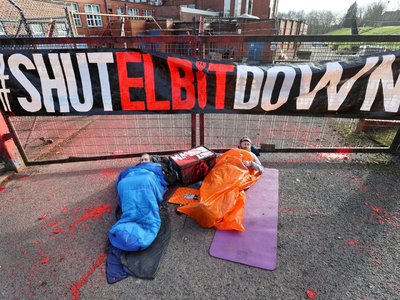Retired British police officer arrested over ‘thought crime’ tweet
Julian Foulkes faced police scrutiny after a tweet regarding anti-Semitism following pro-Palestinian marches, highlighting ongoing tensions in the UK regarding free speech.
Julian Foulkes, a retired special constable from Gillingham, Kent, was arrested at his home over a social media post that expressed concerns about anti-Semitism in light of recent pro-Palestinian marches in the UK.
The incident occurred in November 2023, shortly after pro-Palestinian demonstrations that sparked widespread debates about free speech and hate crimes in Britain.
Foulkes's arrest involved six officers from Kent Police, the force he had served for a decade.
During the arrest, police reviewed his personal library, which included works by authors such as Douglas Murray and issues of The Spectator.
Officers scrutinized a shopping list from his wife, which included items like bleach and gloves, initially suspecting it could suggest malicious intent.
Footage captured by body-worn cameras showed police expressing concern over the contents of Foulkes's home, which they described as containing "very Brexity things."
The retired officer reported that the incident began after he responded to a tweet on X (formerly Twitter) from an account that advocated pro-Palestinian views.
His response warned about the potential escalation of anti-Semitic actions, a message he believed could be misunderstood.
Following the tweet, the Metropolitan Police Intelligence Command referred his post to Kent Police, indicating perceived threats around the online content.
Foulkes reported feeling astonished when officers arrived at his home, particularly given his history in law enforcement.
After being handcuffed and detained for eight hours, Foulkes was interrogated under the Malicious Communications Act.
He was ultimately issued a caution, which was expunged by Kent Police earlier this week after they acknowledged it was inappropriate in the circumstances.
A police spokesperson confirmed that a review would be conducted to identify lessons learned from the incident.
Foulkes highlighted the broader implications of such police actions on freedom of expression in the UK, stating, "I never saw anything like this when I was in the force." His case is among several recent instances where police have intervened in social media communications, including incidents involving parents being questioned over school complaints and a journalist being visited after expressing gender-critical views.
In defense of Foulkes, a spokesperson from the Home Office noted that the incident occurred under the previous government, emphasizing the current administration's focus on priority policing matters, including community safety and violence reduction initiatives.
As the debate continues regarding the policing of online speech, Foulkes's experience raises significant questions about the balance between safeguarding public order and protecting individual rights to freedom of expression.
The incident occurred in November 2023, shortly after pro-Palestinian demonstrations that sparked widespread debates about free speech and hate crimes in Britain.
Foulkes's arrest involved six officers from Kent Police, the force he had served for a decade.
During the arrest, police reviewed his personal library, which included works by authors such as Douglas Murray and issues of The Spectator.
Officers scrutinized a shopping list from his wife, which included items like bleach and gloves, initially suspecting it could suggest malicious intent.
Footage captured by body-worn cameras showed police expressing concern over the contents of Foulkes's home, which they described as containing "very Brexity things."
The retired officer reported that the incident began after he responded to a tweet on X (formerly Twitter) from an account that advocated pro-Palestinian views.
His response warned about the potential escalation of anti-Semitic actions, a message he believed could be misunderstood.
Following the tweet, the Metropolitan Police Intelligence Command referred his post to Kent Police, indicating perceived threats around the online content.
Foulkes reported feeling astonished when officers arrived at his home, particularly given his history in law enforcement.
After being handcuffed and detained for eight hours, Foulkes was interrogated under the Malicious Communications Act.
He was ultimately issued a caution, which was expunged by Kent Police earlier this week after they acknowledged it was inappropriate in the circumstances.
A police spokesperson confirmed that a review would be conducted to identify lessons learned from the incident.
Foulkes highlighted the broader implications of such police actions on freedom of expression in the UK, stating, "I never saw anything like this when I was in the force." His case is among several recent instances where police have intervened in social media communications, including incidents involving parents being questioned over school complaints and a journalist being visited after expressing gender-critical views.
In defense of Foulkes, a spokesperson from the Home Office noted that the incident occurred under the previous government, emphasizing the current administration's focus on priority policing matters, including community safety and violence reduction initiatives.
As the debate continues regarding the policing of online speech, Foulkes's experience raises significant questions about the balance between safeguarding public order and protecting individual rights to freedom of expression.
Comments

Joseph Higginbotham 281 days ago
I'm a USA citizen, aged 76 years. The US has multiple political parties but we are essentially a two party system. The conservative party is called Republican or Grand Old Party (GOP). The "liberal" party is called Democrat. I put the word liberal in quotes because, while both parties have evolved, the Democrat party has evolved into something I don't recognize as associated with the Democrat party of two decades ago. Our Democrat party has attempted to develop "thought policing" and has weaponized our Justice Departments both Federal and State. This article about the retired officer being arrested sounds very similar. So why is this erosion of freedom of expression happening? In my opinion it is very likely to have originated with university professors associated with "humanities." Humanities isn't like mathematics or physics, I have a PhD in physics, where you can run tests of hypothesis and conclude, with a high degree of certainty, whether the hypothesis is trash or a possible explanation of reality. Attempts to test social hypothesis tend to have murky results that are difficult to interpret and are subject to prejudice. In many cases such tests must run for decades to yield any meaningful result. In my opinion, World War Two generated two unintended tests of social structure: East and West Germany, and North and South Korea. These tests ran for decades and the results are similar and damning for communism - "[A] political and economic doctrine that aims to replace private property and a profit-based economy with public ownership and communal control of at least the major means of production (e.g., mines, mills, and factories) and the natural resources of a society." Yet this failed version of socialism creeps into the minds of many academics because it seem "fair" I suppose. Why do these people think, "Oh! We'll do it right this time." Many in the Democrat Party of the USA are pushing toward a version of socialism similar to communism - hence the "thought police" movement and weaponizing of "Justice" for political purposes. I fear that Western Europe may be the source of this disease.











